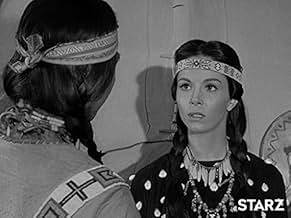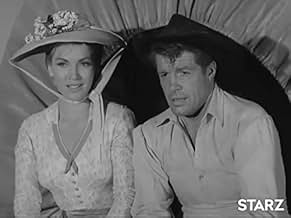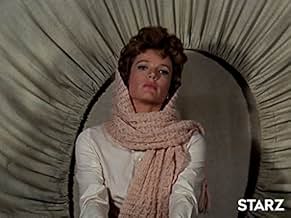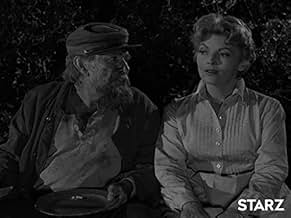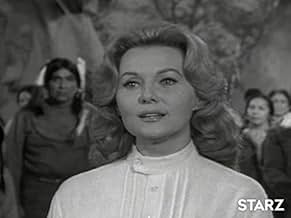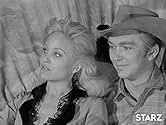Geschichten von den Fahrten eines Planwagenzuges, der nach dem Bürgerkrieg Missouri auf seinem Weg nach Kalifornien durch die Ebenen, Wüsten und Rocky Mountains verlässt.Geschichten von den Fahrten eines Planwagenzuges, der nach dem Bürgerkrieg Missouri auf seinem Weg nach Kalifornien durch die Ebenen, Wüsten und Rocky Mountains verlässt.Geschichten von den Fahrten eines Planwagenzuges, der nach dem Bürgerkrieg Missouri auf seinem Weg nach Kalifornien durch die Ebenen, Wüsten und Rocky Mountains verlässt.
- Für 7 Primetime Emmys nominiert
- 12 Nominierungen insgesamt
Folgen durchsuchen
Empfohlene Bewertungen
Even though this series aired before I was born, it's been a joy to discover. I wish they'd have kept and credited the awesome vocals of the theme song throughout the series. Popular voiceover artist and singer Thurl Ravenscroft (of Tony the Tiger fame) was a part of the vocal ensemble behind the theme song. My Mother loves the character drawings in the opening and closing scenes. So much behind-the-scenes talent help make this series a true western gem.
Perhaps the quintessential show from the Golden Age of TV westerns, this series ran from 1957 to 1965 and it had a simple but compelling format. Each week it told the story of one of the travelers on an 1870's "wagon train" making its way across the American West. This format thus combined the sweeping backdrop of an ever-changing frontier with the small, personal story of a single individual.
So popular did the show become that it attracted an impressive array of "guest stars" -- Bette Davis, Ernest Borgnine, Rhonda Fleming, Barbara Stanwyck, Leslie Nielsen, Lee Marvin, etc.
The earlier shows in the series were probably the best since they featured Ward Bond as the leader of the wagon train and Robert Horton as his scout. Ward's death in 1960 and Horton's departure in 1962 weakened the series though it maintained a respectable level of production for several more years.
While the TV westerns that arose in the Eisenhower years are now nostalgically regarded as fine "family" entertainment, it's curious that they often showed their leading actors stripped half-naked and subjected to various forms of torture. "Wagon Train" was no exception. On the 1-15-1958 episode titled "The Gabe Carswell Story," for example, a bare-chested Robert Horton is staked out spreadeagle-style under the scorching sun and left to die by a villainous "half-breed." And in the 12-13-1961 episode titled "The Traitor," Horton is stripped to the waist, tied to a wagon wheel, and whipped across his bare back. In both cases the sado-masochistic nature of these sequences is emphasized rather than muted and the exposed muscularity of the actor is openly exploited.
While Ward Bond could never be replaced, many viewers looked kindly on his successor, John McIntire. Robert Fuller, however, never quite seemed adequate as Robert Horton's replacement.
So popular did the show become that it attracted an impressive array of "guest stars" -- Bette Davis, Ernest Borgnine, Rhonda Fleming, Barbara Stanwyck, Leslie Nielsen, Lee Marvin, etc.
The earlier shows in the series were probably the best since they featured Ward Bond as the leader of the wagon train and Robert Horton as his scout. Ward's death in 1960 and Horton's departure in 1962 weakened the series though it maintained a respectable level of production for several more years.
While the TV westerns that arose in the Eisenhower years are now nostalgically regarded as fine "family" entertainment, it's curious that they often showed their leading actors stripped half-naked and subjected to various forms of torture. "Wagon Train" was no exception. On the 1-15-1958 episode titled "The Gabe Carswell Story," for example, a bare-chested Robert Horton is staked out spreadeagle-style under the scorching sun and left to die by a villainous "half-breed." And in the 12-13-1961 episode titled "The Traitor," Horton is stripped to the waist, tied to a wagon wheel, and whipped across his bare back. In both cases the sado-masochistic nature of these sequences is emphasized rather than muted and the exposed muscularity of the actor is openly exploited.
While Ward Bond could never be replaced, many viewers looked kindly on his successor, John McIntire. Robert Fuller, however, never quite seemed adequate as Robert Horton's replacement.
When it came to the contestants on Survivor,they wouldn't have a fighting chance of the western frontier with actor Robert Horton. As frontier scout Flint McCullough on Wagon Train(which was on two networks,the first was on NBC-TV from 1957-1962 for the black and white episodes,then it went to ABC-TV from 1962-1965 for the color episodes and was the only show on ABC that was in color and also was expanded to a 90 minute format),he was always pushed to his physical limits. While reconoitering the Conestogas' westward trail,Flint would get waylaid by a windstorm,blizzard or raging river,rattlesnake bites,savage Indians, Mexican bandits,outlaws,and cattle rushers-he took it all in stride. Each week,he'd pick himself up and return to the caravan to report, "Trouble ahead,Major". The wagon master,Major Seth Adams(played by film star Ward Bond),was the big wheel when it debut in 1957 on NBC-TV. Horton's rugged good looks gave the show some necessary sex appeal as those sturdy Conestogas trekked from St. Joesph's Missouri to California,stopping along the way for guest stars like Ronald Reagan,Bette Davis,Barbara Stanwyck,Lee Marvin,Charles Bronson and even a special appearance by John Wayne. However,Horton left the show in 1962 when it moved to ABC. Horton was replaced by actor Robert Fuller(who was a regular on another western series called "Laramie",and also went on to play Dr. Kelly Brackett on the "Emergency" TV series during the 1970's) who took over the reigns of the show until its cancellation in 1965. Wagon Train was not your ordinary western by any means,but its was a history lesson that took you to a time when all you have are your wits to stay alive in the vast frontier of the United States during the 1800's. Catch the episodes on the Family Channel or on the Encore Western Network.
On the strength of this vintage TV' show's 1st season (where I watched all of its 39 episodes) - I enthusiastically give Wagon Train my personal recommendation.
Even though (at a 50-minute running time) a number of the episodes did tend to wear a little thin at times - (For the most part) - The overall majority of these 39 episodes were quite tightly scripted and believable.
I also found the "Old West" settings seemed authentic and the actors could usually be counted on to give convincing performances.
All-in-all - For anyone who enjoys watching top-notch TV Westerns from the 1950s - Wagon Train (filmed in b&w) was right on the mark. I especially liked actors Robert Horton and Terry Wilson.
Even though (at a 50-minute running time) a number of the episodes did tend to wear a little thin at times - (For the most part) - The overall majority of these 39 episodes were quite tightly scripted and believable.
I also found the "Old West" settings seemed authentic and the actors could usually be counted on to give convincing performances.
All-in-all - For anyone who enjoys watching top-notch TV Westerns from the 1950s - Wagon Train (filmed in b&w) was right on the mark. I especially liked actors Robert Horton and Terry Wilson.
As a lad way back in the day I was one big fan of this TV series. Even at that age I appreciated all the famous guest stars this series seemed to attract.
Take a look at the film credits of Ward Bond. You can hardly find a player, male or female, who at one point did not work with Ward Bond. All the more remarkable when you consider his rightwing politics and championing of the blacklist. The man was hated in some circles, but apparently no one denied his talent.
It was a simple concept, Ward Bond as Major Seth Adams and his team led a group of hardy pioneers across the plains and mountains to California post Civil War. EAch episode focused on those traveling in a particular wagon or someone they met on the way who was usually a name guest star.
Wagon Train was enormously popular. When Ward Bond died in November of 1960 it was national news. It was quite a month, his death and that of Clark Gable almost put the election of a new president named Kennedy out of the headlines.
Bond's death also allowed Wagon Train to pioneer what Law and Order later perfected, the revolving change of regulars. Only Frank McGrath and Terry Wilson stayed with the show for the entire run.
Frank McGrath and Terry Wilson were a pair of stunt men who worked a whole lot for John Ford and though they had done some roles with dialog in front of the camera, Wagon Train made their faces familiar to the public. McGrath was funny little guy as cook Charlie Wooster who must have kept them all amused because the regulars were forever complaining about his lousy cooking.
Wilson played Bill Hawks and comments have been made about the horrible continuity Wagon Train had. It sure did and the most glaring example was that when the show first started, Hawks had a wife named Emily in that first season. She was not only dropped. but later on Hawks referred to himself as a bachelor. Couldn't do that today.
John McIntire replaced Bond and was more than adequate as the father figure wagonmaster. There was a good episode that introduced McIntire as a temporary and sadistic wagonmaster played by Lee Marvin takes over and at the same time, the train picks up McIntire who's just seen his family massacred by Indians. McIntire is a former wagonmaster and he and Marvin have a confrontation.
Robert Horton was scout Flint McCullough and several episodes featured him in the lead and they took him to the places he was scouting with guest stars there for him to interact with. Supposedly political differences were pretty rife between him and Bond. He quit as he was planning to do anyway as I remember even after Bond died. Bad career move though, he never got anything as good as Flint McCullough again.
After that a host of new regulars came on the show, Robert Fuller, Denny Miller, and Michael Burns. The train came to an end in 1965. I was sorry to see it end.
Hallmark channel runs Wagon Train sometimes, here's hoping they start them again.
Take a look at the film credits of Ward Bond. You can hardly find a player, male or female, who at one point did not work with Ward Bond. All the more remarkable when you consider his rightwing politics and championing of the blacklist. The man was hated in some circles, but apparently no one denied his talent.
It was a simple concept, Ward Bond as Major Seth Adams and his team led a group of hardy pioneers across the plains and mountains to California post Civil War. EAch episode focused on those traveling in a particular wagon or someone they met on the way who was usually a name guest star.
Wagon Train was enormously popular. When Ward Bond died in November of 1960 it was national news. It was quite a month, his death and that of Clark Gable almost put the election of a new president named Kennedy out of the headlines.
Bond's death also allowed Wagon Train to pioneer what Law and Order later perfected, the revolving change of regulars. Only Frank McGrath and Terry Wilson stayed with the show for the entire run.
Frank McGrath and Terry Wilson were a pair of stunt men who worked a whole lot for John Ford and though they had done some roles with dialog in front of the camera, Wagon Train made their faces familiar to the public. McGrath was funny little guy as cook Charlie Wooster who must have kept them all amused because the regulars were forever complaining about his lousy cooking.
Wilson played Bill Hawks and comments have been made about the horrible continuity Wagon Train had. It sure did and the most glaring example was that when the show first started, Hawks had a wife named Emily in that first season. She was not only dropped. but later on Hawks referred to himself as a bachelor. Couldn't do that today.
John McIntire replaced Bond and was more than adequate as the father figure wagonmaster. There was a good episode that introduced McIntire as a temporary and sadistic wagonmaster played by Lee Marvin takes over and at the same time, the train picks up McIntire who's just seen his family massacred by Indians. McIntire is a former wagonmaster and he and Marvin have a confrontation.
Robert Horton was scout Flint McCullough and several episodes featured him in the lead and they took him to the places he was scouting with guest stars there for him to interact with. Supposedly political differences were pretty rife between him and Bond. He quit as he was planning to do anyway as I remember even after Bond died. Bad career move though, he never got anything as good as Flint McCullough again.
After that a host of new regulars came on the show, Robert Fuller, Denny Miller, and Michael Burns. The train came to an end in 1965. I was sorry to see it end.
Hallmark channel runs Wagon Train sometimes, here's hoping they start them again.
Wusstest du schon
- WissenswertesWard Bond (Major Seth Adams) and Robert Horton (Flint McCullough) did not get along on the set. According to Horton, Bond spread rumors about his sexuality. The two men settled their differences two days before Bond died.
- PatzerOften, when people are aboard the wagons conversing, the back projection of the scenery passing appears to have been shot at thirty miles per hour or more, which would be a velocity rarely approached by a covered wagon.
- VerbindungenFeatured in TV's Western Heroes (1993)
Top-Auswahl
Melde dich zum Bewerten an und greife auf die Watchlist für personalisierte Empfehlungen zu.
Details
- Laufzeit
- 1 Std. 15 Min.(75 min)
- Sound-Mix
Zu dieser Seite beitragen
Bearbeitung vorschlagen oder fehlenden Inhalt hinzufügen


